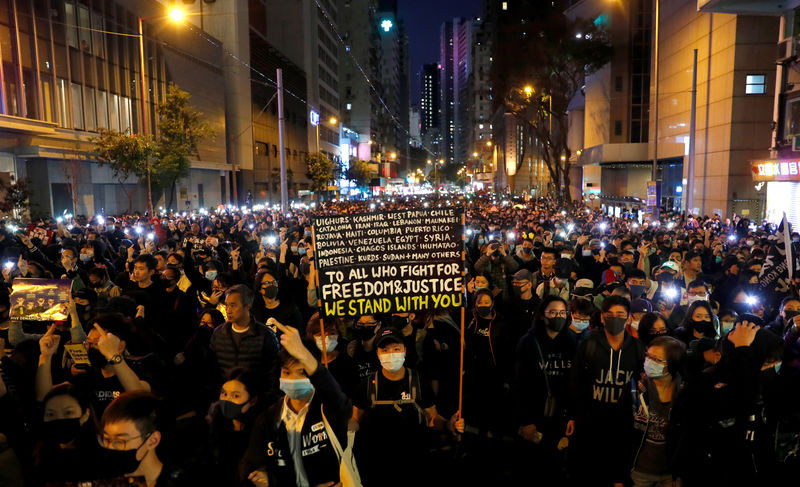By Kate O'Donnell-Lamb and Jessie Pang
HONG KONG (Reuters) - Vast crowds of black-clad demonstrators thronged Hong Kong on Sunday in the largest anti-government protests since local elections last month that boosted the pro-democracy movement seeking to curb controls by China.
It was the first time since August that the Civil Human Rights Front - organizer of million-strong marches earlier in the year that paralyzed the Asian finance center - had received authorities' permission for a rally.
It estimated turnout of 800,000 while police said 183,000.
Chants of "Fight for freedom! Stand with Hong Kong!" echoed as demonstrators, from students to professionals and the elderly, marched from Victoria Park in the bustling shopping district toward the financial area.
As dark fell, some protesters spray-painted anti-Beijing graffiti on a Bank of China building. Riot police stood on guard, restrained as protesters yelled "dogs" and "cockroaches."
The former British colony of 7.4 million people reverted to Chinese rule in 1997. It is governed under a "One Country, Two Systems" formula guaranteeing freedoms not allowed in mainland China, but many fear Beijing is tightening the screws.
"It's Christmas time soon but we're not in the mood to celebrate anymore," said Lawrence, a 23-year-old student.
He held a poster saying: "My 2020 wish is universal suffrage", a reference to demands for an open vote on the city leader, currently the unpopular Beijing-backed Carrie Lam.
China blames the six months of unrest on interference by foreign governments including the United States and Britain.
On Saturday, two leaders of the American Chamber of Commerce in Hong Kong were denied entry to the neighboring Chinese city of Macau, without explanation.
LAM UNDER PRESSURE
Lam says she has heard the people but has not offered concessions despite a resounding win for pro-democracy parties in local elections two weeks ago. They secured almost 90% of 452 district council seats in a record turnout.
At Sunday's protest, chants of "five demands, not one less" rang out, referring to demands ranging from Lam's resignation to an amnesty for detainees.
"I will fight for freedom until I die because I am a Hong Konger," said June, a 40-year-old mother dressed in black seated on the grass in Victoria Park.
Police said they arrested another 11 people, aged 20 to 63, confiscating weapons including army knives, firecrackers, bullets and a semi-automatic pistol, the first seizure of a handgun during the protests.
Once rare for Hong Kong, violence has escalated throughout the year, as protesters have torched vehicles and buildings, hurled petrol bombs, dropped debris from bridges onto traffic and vandalized shopping malls. Police have responded with tear gas, water cannon and, at times, live fire.
Protests coalesced in June over a now-shelved extradition bill that would have allowed people to be sent to mainland China for trial, then evolved into broader democracy calls.
There was no comment on Sunday from Hong Kong's government, though the day before it pledged to "humbly" listen and accept criticism. The new police boss promised a flexible approach to protests, with "both the hard and soft approach."
Since June, Hong Kong has seen more than 900 demonstrations, processions and public meetings, many ending in violent confrontations. Nearly 6,000 people have been arrested.

There has, however, been relative calm since the Nov. 24 vote. While demonstrations pop up on an almost daily basis, at times disrupting businesses, schools and transport, life for most goes on as normal.